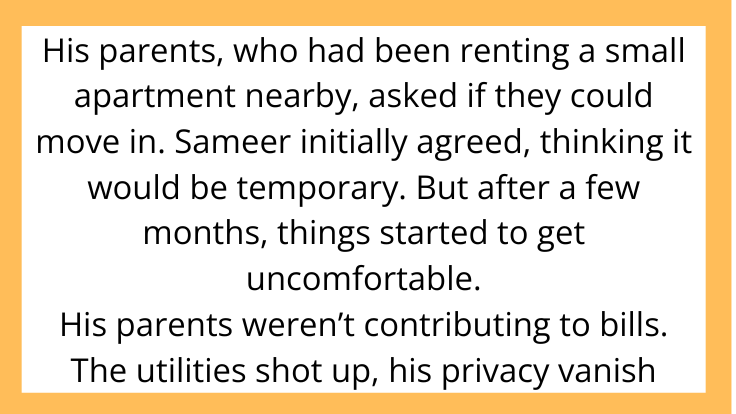AITAH for Making My Parents Pay Rent to Live in the House I Inherited from My Grandmother?
When family and finances collide, things can get awkward—fast. In this emotionally charged AITAH scenario, we examine a difficult choice that has sparked a storm of opinions: Is asking your parents to pay rent a betrayal of family values, or a justified boundary?
Let’s unpack the story that has Reddit talking.
The Backstory: A Grandmother’s Gift, A Son’s Dilemma

A 28-year-old man—let’s call him Sameer—posted on r/AITAH about a tough situation he found himself in. A year ago, Sameer’s beloved grandmother passed away and left her house to him in her will. It wasn’t a mansion, but it was fully paid off and in good condition. Sameer saw it as a blessing—a foundation for his future.
His parents, who had been renting a small apartment nearby, asked if they could move in. Sameer initially agreed, thinking it would be temporary. But after a few months, things started to get uncomfortable.
His parents weren’t contributing to bills. The utilities shot up, his privacy vanished, and his plans to renovate the house for his own use were put on hold. That’s when Sameer did something bold—he asked them to start paying rent.
The Confrontation: “We’re Your Parents, Not Tenants”

Sameer told Reddit that he had a polite but firm conversation with his parents, explaining that while he respected them, he couldn’t continue covering all expenses alone. He asked for a modest monthly rent to help with bills and maintenance.
His parents were stunned. His father accused him of being ungrateful and disrespectful. His mother cried, saying they felt like “strangers” in their own family. Extended family members caught wind of the situation and began calling Sameer selfish and greedy.
Feeling guilty but overwhelmed, Sameer turned to Reddit for judgment: AITAH for making my own parents pay rent to live in a house I inherited?
The Arguments: Entitlement vs. Responsibility

Why Sameer Might Not Be the Villain
Reddit users were quick to defend Sameer. Here’s why:
-
Inherited means owned: The house legally belongs to him. That gives him the right to set terms, especially when he’s the one handling all maintenance and costs.
-
Contributions matter: Even if it’s family, living somewhere rent-free without helping with expenses can strain any relationship.
-
Boundaries are not betrayal: Asking for rent isn’t kicking someone out—it’s creating a sustainable way to live together.
One Redditor summed it up perfectly: “You’re not charging market rent. You’re asking for help. That’s not selfish. That’s survival.”
Why Some Say Sameer Crossed a Line
On the other side, a small but vocal group empathized with the parents:
-
Family before finances: In many cultures, children are expected to support aging parents, not charge them.
-
Emotional context: The house may have sentimental value to the parents too—it belonged to their mother, after all.
-
Sudden shift: They may have assumed it was a family home, not a business arrangement.
For these people, Sameer’s move felt cold, especially given how tight-knit the family seemed before.
The Cultural Angle: When Traditions Collide with Modern Realities

This story hits a nerve because it touches on cultural expectations. In many families—especially in South Asian, African, Middle Eastern, and Latino cultures—elders are never expected to pay rent to their children. Living together is seen as part of family duty, not a financial exchange.
But modern realities are different. Rising living costs, independence, and generational divides in values often clash with tradition. Younger people like Sameer are navigating uncharted territory—wanting to honor their roots without sacrificing their mental, emotional, or financial health.
What Could Sameer Have Done Differently?

It’s clear that Sameer’s request wasn’t evil—but maybe the delivery could’ve been better.
Here’s how he could’ve softened the blow:
-
Frame it as shared responsibility, not “rent”.
-
Offer a formal breakdown of expenses so it’s clear he’s not profiting.
-
Set a temporary timeline—“Let’s do this for six months and revisit.”
-
Involve a neutral third party, like a counselor or elder family friend, to mediate.
Communication is key. Rent or no rent, how we talk to family makes all the difference.
Final Thoughts: Tough Love or Just Tough?

Sameer isn’t alone in this struggle. Many young adults today face the difficult balance of supporting family while maintaining their own independence.
In the end, AITAH isn’t always about who’s right or wrong. It’s about perspective, context, and how well we communicate our needs.
Sameer’s choice may not be popular with everyone, but it doesn’t make him heartless. Sometimes, asking for help—or fairness—is the most loving thing you can do.



